Communities on the SA/Victoria border uproot their lives to survive amid new COVID-19 rules
These are the faces of just some of the people affected by the SA-Victorian border crackdown. Entire families moving in with someone else, kids forced out of school, parents unsure if they can keep their jobs – life has suddenly been thrown into utter chaos. READ THEIR STORIES
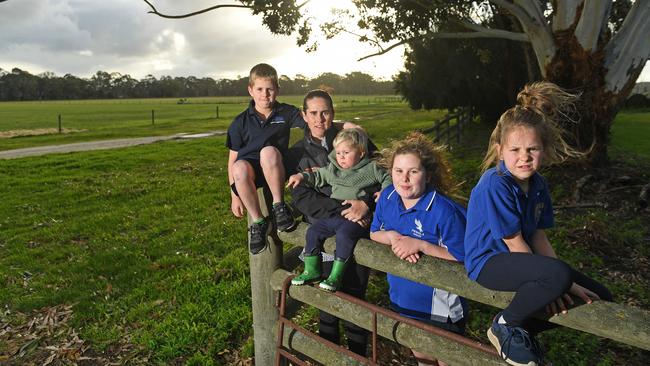
Coronavirus
Don't miss out on the headlines from Coronavirus. Followed categories will be added to My News.
- Premier urges WA and Tasmania to open up
- Shearers brace for a tough season with less out-of-state support
Teegan Galpin and her children have had to arrange an indefinite sleepover at her parents’ house as they deal with the harsh realities of SA’s tough new border controls.
The 30-year-old and her four children, Mia, 11, Oscar, 8, Ruby, 7, and Spencer, 18 months, have moved in with her parents David and Alison so the kids can keep attending Penola Primary.
They usually live just over the Victorian border on farmland the family owns in Dorodong.
“If I didn’t come over the border, I probably would have had to take them out of school for six months or however long it would have taken for the ban to lift,” Teegan said. She also would have had to give up her work as a farmhand to look after the children full-time.
“It’s definitely not what I had in mind, moving back into home with my parents with my four children,” she said. The single mother said moving back to her parents’ farm at Penola was her “only option” and she counted herself lucky for having the family support.
“Sometimes you wonder are you making the right decision, but the next day comes and there’s another day after that and you just keep going,” she said.
A common theme among families affected by the changes is the border crackdown’s indefinite timeframe – they don’t know how long their children will be out of school, or they will be out of work.
To make matters worse, Teegan was fined for travelling on a road that didn’t have a border checkpoint when she was driving between her family’s properties.
David predicts the farm’s income will reduce by a third this year because of the pandemic. “Up until probably a week ago, we were handling it fine, but this harder lockdown, there’s been a lot of nights that we haven’t had a lot of sleep,” he said.
HOMESCHOOLING OVER THE BORDER
At Warrock, north of Casterton, Sophie Simson, 36, will be homeschooling her son Gus, 5, from today, along with looking after her other son, Max, 3, as Gus will no longer be able to attend Penola Primary.
It’s a far cry from her plans for 2020 – she was running a business preparing grazing platters and had just received her South Australian teacher’s registration before the pandemic hit.
But thanks to COVID-19, neither work pathway is an option at the moment. She is waiting to hear whether her husband Geordie will receive essential traveller status so he can keep working as an agriculture pilot based out of Naracoorte.
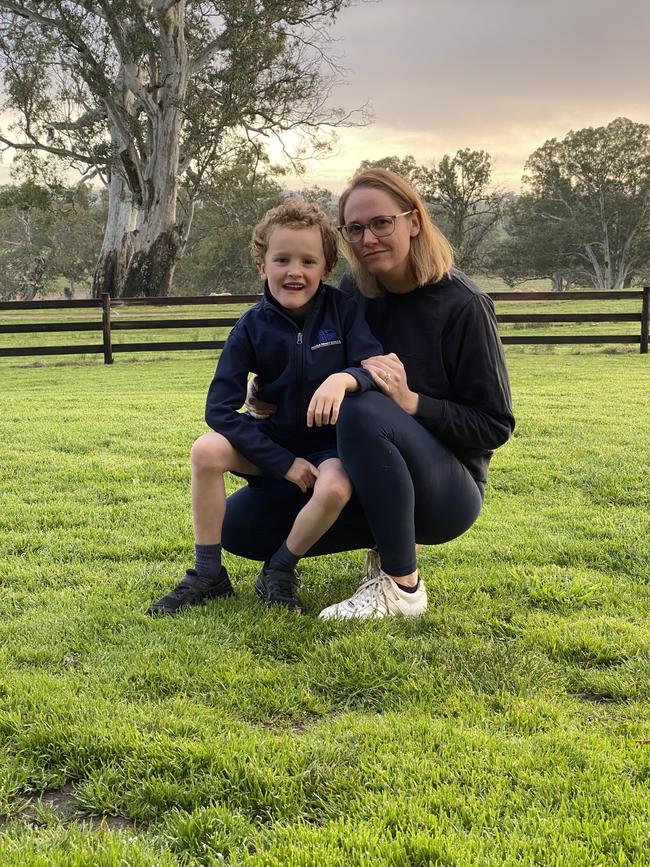
Explaining to Gus why he can’t attend school anymore has been difficult, Mrs Simson said.
“His friend went home and said Gus is getting banned from school because the police won’t let him go there,” she said.
“He’s asked questions about why can so and so go to school but I can’t.
“They haven’t set any goals of what Victoria has to look like before they open it up to us again.”
The changes are “very stressful”, Ms Simson said, but she and Geordie, who live on sheep farming property, are trying to keep a level head and take one day at a time.
“Home-schooling doesn’t bother me but my main worry is Gus’s social interaction. All his peers are still together experiencing prep, or foundation, together and he’s missing out.”
THE FUTURE OF WORK
At Apsley, 10km over the border, Maddi Redding is concerned about her family’s income this year, with her partner Hamish Kester - a contract harvester - unable to access farms in NSW to work.
He is now waiting for his application as an essential traveller to be assessed, which will determine whether he can work in SA.
Ms Redding is on maternity leave from her role as a theatre nurse at Naracoorte Hospital, and it’s unclear whether she will be able to return to work as planned in October.
“A lot of well-meaning South Australians make jokes about Victorians and it’s really hurtful at the moment because we’re doing all the right things and we still get punished for it,” she said.
“I think there’s a lot of people along the border communities whose mental health has taken a real hit.”
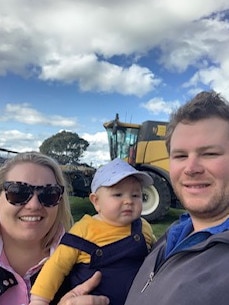
THE TINY SCHOOL
Apsley Primary has just 26 students, including a third living in South Australia.
Principal Tanya Turner says those students will move to remote learning, and five of the seven staff will also be working remotely from today (Friday, August 21) as they live in South Australia.
“We have a lot of families with both parents working and we’re opening for those families,” she said.
“We’ve also got quite a few vulnerable children who will need to be at school – we’re their stable environment, and we’ve also got a couple of children with disabilities who are entitled to be at school.”
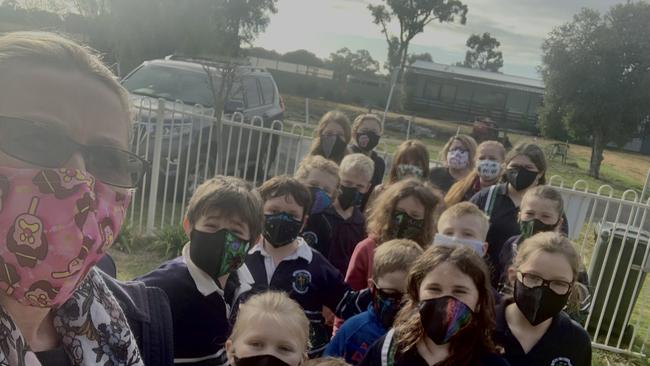
It was a stressful time, Ms Turner said, as the difficulties students will face could put the school’s future at risk.
“It could be easier for the kids to go to school in SA, which would mean nine enrolments moved from Apsley Primary, which is vital in our school.”
She said the news that cross border community members could no longer travel up to 40km into SA, hit the school hard.
“The first day we were walking around like zombies – we just couldn’t fathom it.”
SERVING HER COMMUNITY
At the Dartmoor General Store, about 30km over the Victorian border, Brooke Ropitini will be bringing her children Mason, 11, and Remi, 9 to work with her, because they can no longer attend Glenburnie Primary in person.
Also of concern is the impact on the wider community, as much of the store’s stock comes from Mount Gambier.
“We’re very fortunate that we live in such a small-knit community and we’ve got a backyard and we have things to do outside rather than being in the city,” Mrs Ropitini said.
“(But) a lot of people put a lot of time, money and effort into (Mount Gambier) and to be treated like a leper is just horrible.”
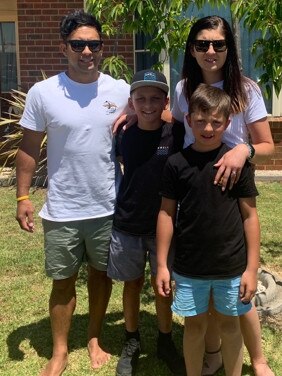
Peter Gandolfi, chairman of the Limestone Coast arm of Regional Development Australia, said while there was a lot of confusion about the border controls, most locals understood why the State Government was taking a tough stance.
“The difficulty is those that do live just over the border don’t have restrictions to travel further into Victoria,” Mr Gandolfi said.
“If there was an outbreak of COVID-19 in the Limestone Coast, particularly in Mount Gambier, that would close down SA’s largest (regional) city.”
Premier Steven Marshall was hopeful the new border controls would not need to be in place long.
“They have only ever been designed as a temporary arrangement to protect the front line here in South Australia and the South-East is the front line,” he said.
Temporary relief teachers will fill the gaps caused by about 20 staff who live in Victoria and can no longer commute across the border.
State and federal MPs, whose electorates cover border communities, have written to police chiefs in SA and Victoria calling for a collaborative approach to dealing with the emergency measures.
